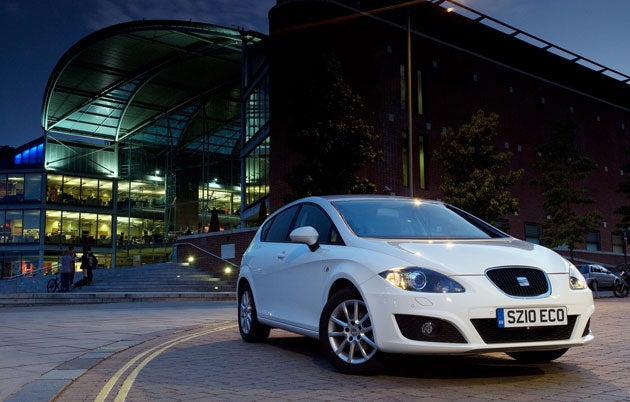Seat Leon Ecomotive SE 1.6 CR

It must be one of the biggest industrial switch-over programmes in history. For over a decade, Volkswagen's 1.9 litre TDI engine with its Pumpe-Düse (PD) injection system has been providing solid service in millions of cars all over the world. VW PD engines generally provide fairly lively performance but are also rather rough and tend to deliver their go over a fairly narrow band of revs. Diesels using the common rail (CR) system first adopted by Fiat and Mercedes tend to be smoother, and a few years ago, Volkswagen bowed to the inevitable and introduced common rail engines of its own, beginning a long-drawn out programme of migration that will probably one day see the 1.9 PD entirely replaced by these more modern power units.
In fact, the 1.9 PD engine has not just one, but two successors, a 1.6 litre common rail engine, and a more powerful 2.0 litre CR (confusingly, there's also a PD 2.0), but in most cases the smaller 1.6 is capable of providing at least as much performance as the old 1.9 did, and so it is with the latest model to benefit from the switch, the economy-oriented Ecomotive version of Seat's Leon.
The new Ecomotive provides the same 105 horsepower as the one using the old engine, but emits only 99g/km of CO2 according to official tests, rather than the previous 119g/km, although the new 1.6 CR is helped by a stop-start system (Seat calls it start/stop) of the type that is becoming increasingly popular as a fuel-saving measure.
On the road, the 1.6 lived up to its reputation, providing smooth, quiet performance on my South London test route, which also showed the stop-start system to its best advantage. In slow traffic, the engine was shut down for perhaps a third of the time while I waited at traffic lights with the car in neutral and the handbrake on; it's more difficult to achieve a smooth, shudder-free restart with a diesel than it is with a petrol engine, but Seat's system works unobtrusively. The result is an exceptional official combined cycle fuel consumption figure of 74.3mpg.
My test provided few opportunities to extend the Leon or its engine, but I thought its ride, while firm, was quite a bit nicer than the rock-hard set up on some previous mid-sized Seats. Apart from that, the latest Ecomotive is simply a Leon, with all the pros and cons that involves. Previously, I'd have put the Leon's styling in the "con" column, but I have to admit that growing familiarity, mid-life styling tweaks by Seat and the fashionable white colour scheme of our test car, mean that I would now list its appearance as a "pro", even if I still can't get on with the company's dumpier mid-range Altea, which, incidentally, also benefits from the switch to 1.6 litre CR power in Ecomotive form.
The Leon Ecomotive faces plenty of competition, not least from similarly-engined eco models from in-house rivals Volkswagen and Skoda. The Leon Ecomotive's prices start at £16,840 (our test car was the more luxuriously equipped SE at £18,140), which compares with an £18,100 starting point for the most basic Golf BlueMotion, which only has three doors to the Leon's five. On the other hand, Skoda's excellent Octavia Greenline is only £17,255, but doesn't benefit from stop-start, and has higher emissions as a result (114g/km). The Seat comfortably undercuts Ford's Focus Econetic, but it's still quite a bit pricier than Kia's competent cee'd 1.6 CRDi EcoDynamics model at £14,955, which again can't quite match the Leon Ecomotive for CO2 (it emits 110g/km according to official tests).
The Leon Ecomotive is also cheaper than Toyota's Auris and Prius hybrids, but costs about the same as Honda's Insight hybrid, a less well-rounded but interesting off-beat alternative.
Seat Leon Ecomotive SE 1.6 CR
Price: £18,140
Top speed: 118 mph, 0-62 mph in 11.5 seconds
Fuel consumption: 74.3 mpg
CO2 emissions: 99 g/km
Rivals: Ford Focus EcoNetic, Kia cee'd EcoDynamics, Honda Insight, Skoda Octavia Greenline, Volkswagen Golf BlueMotion
Join our commenting forum
Join thought-provoking conversations, follow other Independent readers and see their replies
Comments
Bookmark popover
Removed from bookmarks